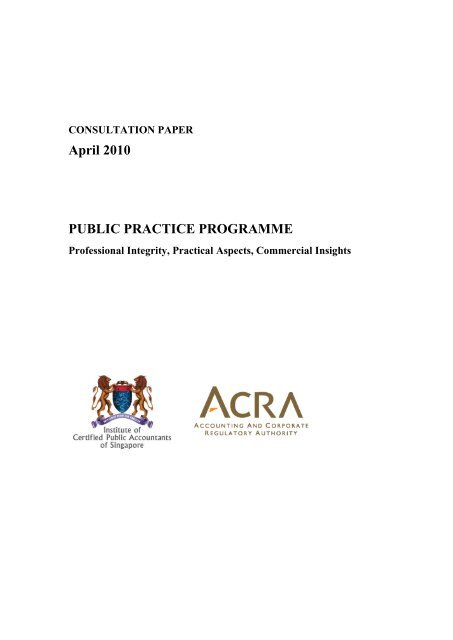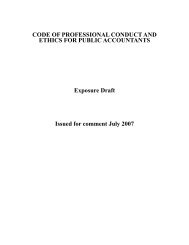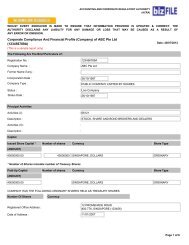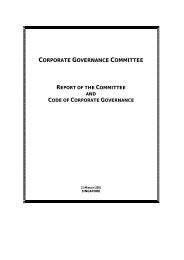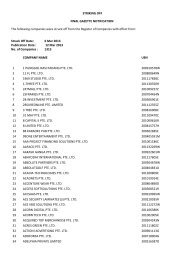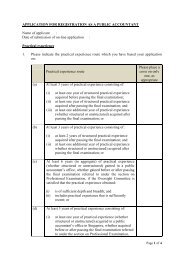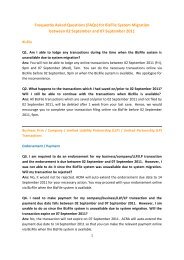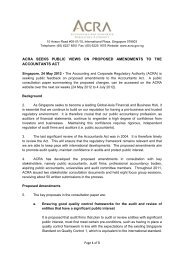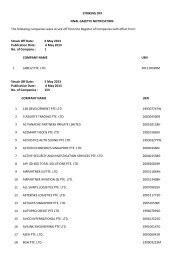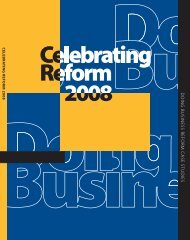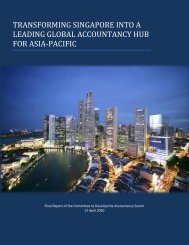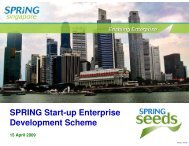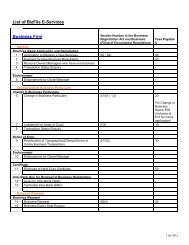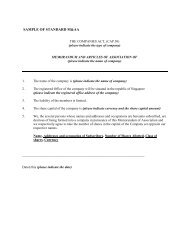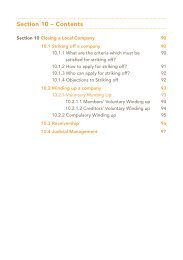Objectives of the Public Practice Program - ACRA
Objectives of the Public Practice Program - ACRA
Objectives of the Public Practice Program - ACRA
Create successful ePaper yourself
Turn your PDF publications into a flip-book with our unique Google optimized e-Paper software.
CONSULTATION PAPER<br />
April 2010<br />
PUBLIC PRACTICE PROGRAMME<br />
Pr<strong>of</strong>essional Integrity, Practical Aspects, Commercial Insights
PREFACE<br />
This consultation paper sets out <strong>the</strong> proposed new <strong>Public</strong> <strong>Practice</strong><br />
<strong>Program</strong>me, which is being considered as a requirement for registration<br />
as a <strong>Public</strong> Accountant (P.A).<br />
2. The Institute <strong>of</strong> Certified <strong>Public</strong> Accountants <strong>of</strong> Singapore (ICPAS) and<br />
<strong>the</strong> <strong>Public</strong> Accountants Oversight Committee (PAOC) <strong>of</strong> <strong>the</strong><br />
Accounting and Corporate Regulatory Authority (<strong>ACRA</strong>) invite<br />
interested parties to submit <strong>the</strong>ir comments on <strong>the</strong> proposals on <strong>the</strong><br />
<strong>Public</strong> <strong>Practice</strong> <strong>Program</strong>me (PPP) made in this paper. Submission by<br />
email is encouraged. Please submit your written comments by 17 th May<br />
2010 to:<br />
Email:<br />
technical@icpas.org.sg<br />
Facsimile: (65) 6749-8061<br />
Mail:<br />
Institute <strong>of</strong> Certified <strong>Public</strong> Accountants <strong>of</strong><br />
Singapore<br />
Technical Division<br />
20 Aljunied Road<br />
#01-04 CPA House<br />
Singapore 389805<br />
(Attention: Mr Ramchand Jagtiani / Ms Evelyn<br />
Tan)<br />
3. Comments are most helpful if <strong>the</strong>y:<br />
(a) Comment on <strong>the</strong> questions stated;<br />
(b) Indicate <strong>the</strong> specific paragraphs or paragraphs to which <strong>the</strong><br />
comments relate;<br />
(c) Contain a clear rationale; and<br />
(d) Describe any alternative that should be considered.<br />
Respondents need not comment on all <strong>of</strong> <strong>the</strong> questions and are<br />
encouraged to comment on any additional issues.<br />
ICPAS and <strong>ACRA</strong> will consider all comments received by <strong>the</strong> 17th <strong>of</strong><br />
May 2010. In considering <strong>the</strong> comments, ICPAS and <strong>ACRA</strong> will base<br />
<strong>the</strong>ir conclusions on <strong>the</strong> merits <strong>of</strong> <strong>the</strong> arguments put forth, not on <strong>the</strong><br />
number <strong>of</strong> responses.<br />
ICPAS reserves <strong>the</strong> right to publish responses received and to change<br />
<strong>the</strong> proposed programme contents. Submitters who do not want <strong>the</strong>ir<br />
name to be published with <strong>the</strong>ir submission should indicate this clearly<br />
on <strong>the</strong>ir submission.
SUMMARY OF PROPOSED PPP AND CONSULTATION QUESTIONS<br />
i. ICPAS has developed <strong>the</strong> <strong>Public</strong> <strong>Practice</strong> <strong>Program</strong>me (PPP) with <strong>the</strong><br />
intention <strong>of</strong> creating a specially designed course on pr<strong>of</strong>essional practice<br />
and ethics for CPAs Singapore who aspire to become a public<br />
accountant and enter public practice in Singapore.<br />
ii.<br />
iii.<br />
Under <strong>the</strong> Accountants (<strong>Public</strong> Accountants) Rules [<strong>the</strong> Rules] <strong>of</strong> <strong>the</strong><br />
Accountants Act (AA), every applicant for registration as a <strong>Public</strong><br />
Accountant must complete a course on ethics and pr<strong>of</strong>essional practice<br />
subjects as may be determined by <strong>the</strong> PAOC. Currently, for this purpose<br />
<strong>the</strong> PAOC prescribes ICPAS’s 5-day Pre-admission Course (PAC)<br />
which must be undertaken by all accountants who want to be ICPAS<br />
members regardless <strong>of</strong> whe<strong>the</strong>r <strong>the</strong>y want to enter public practice.<br />
<strong>ACRA</strong> and ICPAS have carried out a review <strong>of</strong> <strong>the</strong> suitability <strong>of</strong> <strong>the</strong><br />
PAC in meeting <strong>the</strong> course requirement <strong>of</strong> <strong>the</strong> AA Rules. Arising from<br />
<strong>the</strong> review, ICPAS has developed <strong>the</strong> proposed PPP, which is tailored<br />
specifically to better meet <strong>the</strong> needs <strong>of</strong> <strong>the</strong> requirements under <strong>the</strong> Rules<br />
in relation to prospective <strong>Public</strong> Accountants. A tailored PPP will help<br />
to ensure that all new <strong>Public</strong> Accountants are sufficiently prepared for<br />
<strong>the</strong> important responsibilities <strong>of</strong> <strong>the</strong>ir role, particularly in <strong>the</strong> role <strong>of</strong><br />
statutory auditor, when <strong>the</strong>y enter into public practice.<br />
The proposed PPP will form an important step in <strong>the</strong> pathway to<br />
becoming a public accountant The PPP’s objective is to provide<br />
practical insights on public practice, to better equip entrants to <strong>the</strong> public<br />
accountancy pr<strong>of</strong>ession in important areas, including:<br />
- reinforcing pr<strong>of</strong>essional ethics and <strong>the</strong> public interest element <strong>of</strong><br />
public practice,<br />
- dealing with <strong>the</strong> commercial realities <strong>of</strong> running a public accountancy<br />
practice, and<br />
- putting in place <strong>the</strong> right processes and procedures to efficiently<br />
manage resources and ensure compliance with <strong>the</strong> high standards<br />
required <strong>of</strong> a public accountant and his or her firm.<br />
With this focus, <strong>the</strong> PPP is aimed at helping prospective public<br />
accountants to plan a successful, efficient and compliant practice<br />
capable <strong>of</strong> delivering quality services.<br />
iv.<br />
<strong>Public</strong> accountants perform a vital public interest role and operate within<br />
a regulated environment that requires adherence to high standards. As<br />
such, <strong>the</strong> PPP will place particular emphasis on <strong>the</strong> public interest aspect<br />
<strong>of</strong> public practice. The <strong>Program</strong>me will cover <strong>the</strong> principal laws and<br />
regulations that are relevant to <strong>the</strong> public accountancy pr<strong>of</strong>ession.
v. ICPAS developed <strong>the</strong> PPP jointly with <strong>the</strong> Institute <strong>of</strong> Chartered<br />
Accountants <strong>of</strong> Scotland (ICAS), <strong>the</strong> oldest accounting body in <strong>the</strong><br />
world having been established in 1854. An ICPAS taskforce guided <strong>the</strong><br />
development <strong>of</strong> <strong>the</strong> PPP. The Taskforce members were:<br />
• Ms Cheng Ai Phing, Deloitte & Touche LLP (Chair);<br />
• A/P Khoo Teng Aun, Singapore Management University;<br />
• Mr Lee Chee Wung, Lee Chee Wung & Co.;<br />
• M Lian Wee Cheow, PricewaterhouseCoopers LLP;<br />
• Mr Lim Boon Cheng, LTC LLP;<br />
• A/P Patricia Tan, Nanyang Technological University;<br />
• Mr Joseph Toh, Baker Tilly TFWLCL; and<br />
• Mr Tom Yee, Independent Director and a Retired Audit Partner.<br />
vi.<br />
vii.<br />
viii.<br />
ix.<br />
The course content is localised by Singapore content writers, who are<br />
Practising CPAs Singapore.<br />
To ensure ongoing quality, <strong>the</strong> PPP will be subject to oversight and<br />
quality assurance by a PPP oversight committee which will comprise<br />
experienced audit practitioners. This committee will periodically review<br />
<strong>the</strong> course content for improvements or enhancements and to keep <strong>the</strong><br />
course up to date with changes in legislation and relevant promulgations.<br />
The course outlines will be constantly reviewed for relevance taking into<br />
account developments in <strong>the</strong> market place, changes to <strong>the</strong> regulatory<br />
framework and amendments to standards, ethical requirements and o<strong>the</strong>r<br />
pr<strong>of</strong>essional responsibilities.<br />
Accountants who plan to apply to be ICPAS members would still be<br />
required to undertake <strong>the</strong> PAC. A such, applicants to become a public<br />
accountant would still need to have undertaken <strong>the</strong> PAC when becoming<br />
ICPAS members (i.e. if <strong>the</strong>y are not a member already) and <strong>the</strong>n would<br />
complete <strong>the</strong> PPP nearer <strong>the</strong> time when <strong>the</strong>y apply to be a public<br />
accountant.<br />
ICPAS is targeting to <strong>of</strong>fer <strong>the</strong> PPP from August 2010 and, subject to<br />
comments on <strong>the</strong> transitional arrangements from stakeholders, it is<br />
envisaged that <strong>the</strong> PPP will become a compulsory requirement for<br />
registration as a public accountant on or after 25 August 2010 (or soon<br />
after that date). Applicants who attend <strong>the</strong> course in August 2010, but<br />
apply after <strong>the</strong> course becomes compulsory, would satisfy <strong>the</strong><br />
requirement.
CONSULTATION QUESTIONS<br />
Question 1: <strong>Objectives</strong> <strong>of</strong> <strong>the</strong> PPP<br />
Summary: The paper proposes that <strong>the</strong> objective <strong>of</strong> <strong>the</strong> PPP is to prepare<br />
prospective public accountants by providing practical insights on <strong>the</strong><br />
commercial and public interest facets <strong>of</strong> public practice.<br />
Question 1: Are <strong>the</strong>re additional objectives that should be considered?<br />
Question 2: Content<br />
Summary: The paper proposes that <strong>the</strong> PPP:<br />
<br />
<br />
<br />
Contains modules on commercial aspects, practice management and <strong>the</strong><br />
regulatory framework;<br />
Complies with relevant International Education Standards <strong>of</strong> International<br />
Federation <strong>of</strong> Accountants (IFAC); and<br />
Includes requirements <strong>of</strong> Singapore Standard on Quality Control 1 and<br />
<strong>the</strong> Pr<strong>of</strong>essional Conduct and Ethics Codes <strong>of</strong> ICPAS and <strong>ACRA</strong>.<br />
Question 2: With regard to <strong>the</strong> content outlined in <strong>the</strong> consultation paper, are<br />
<strong>the</strong>re any o<strong>the</strong>r features or content that should be included within <strong>the</strong> PPP? If<br />
so, what are <strong>the</strong>se?<br />
Question 3: PPP Delivery<br />
Summary: The PPP would:<br />
<br />
<br />
<br />
<br />
Be <strong>of</strong> a three-full-day duration;<br />
Be conducted as a participative style workshop;<br />
Include case studies and discussions; and<br />
Not have a formal exam.<br />
Question 3: Do you agree with <strong>the</strong> workshop style delivery approach proposed<br />
in <strong>the</strong> paper? If not, how could <strong>the</strong> delivery approach be improved?<br />
Question 4: Transitional Arrangements<br />
Summary: The PAOC intends to make <strong>the</strong> PPP a requirement for registration as<br />
a public accountant, and is considering that all applicants who apply on or after<br />
25 August 2010 (or soon after that date) should attend <strong>the</strong> course. The course<br />
will be <strong>of</strong>fered from August 2010 and is proposed to be run not less than three<br />
times per year and subject to demand. The first course is targeted to run in<br />
August 2010 and <strong>the</strong> second one tentatively in September/October 2010.
Question 4: Do you foresee any practical difficulties imposed on would-be<br />
applicants who plan to apply for registration as public accountants on or after<br />
15 August (or soon after) in terms <strong>of</strong> fulfilling <strong>the</strong> requirement to attend <strong>the</strong><br />
PPP?<br />
If so, what are <strong>the</strong>se practical difficulties?<br />
Question 5: Do you have any o<strong>the</strong>r comments on <strong>the</strong> PPP as outlined in<br />
this Consultation Paper?
Paragraph<br />
Introduction 1 – 2<br />
Target Audience 3<br />
<strong>Program</strong>me Developer 4<br />
Key <strong>Program</strong>me Features and Course Content 5<br />
Methodology and Delivery 6<br />
Oversight and Quality Assurance 7<br />
Conclusion 8<br />
Summary <strong>of</strong> Questions 9
ONE – INTRODUCTION: BACKGROUND<br />
1.1 An applicant applying to <strong>the</strong> Accounting and Corporate Regulatory<br />
Authority (<strong>ACRA</strong>) for registration as a public accountant must, among<br />
o<strong>the</strong>r requirements, be a non-practising member <strong>of</strong> The Institute <strong>of</strong><br />
Certified <strong>Public</strong> Accountants <strong>of</strong> Singapore (ICPAS) and must<br />
successfully complete a course on ethics and pr<strong>of</strong>essional practice<br />
subjects.<br />
1.2 Currently, <strong>ACRA</strong> recognises <strong>the</strong> ICPAS Pre-Admission Course (PAC)<br />
as <strong>the</strong> course on ethics and pr<strong>of</strong>essional practice subjects that is required<br />
for registration as a public accountant. While <strong>the</strong> Pre-Admission Course<br />
fulfills ICPAS membership requirements, it may not be deemed<br />
sufficiently adequate for CPAs Singapore who are ready to enter public<br />
practice in <strong>the</strong>ir own right, i.e. who have experience <strong>of</strong> between three to<br />
five or more years in a public accounting entity, in terms <strong>of</strong> preparing<br />
<strong>the</strong>m to effectively and efficiently run a public practice providing<br />
quality public accountancy services.<br />
1.3 ICPAS has embarked on <strong>the</strong> development <strong>of</strong> a public practice<br />
programme (PPP) to prepare CPAs Singapore who are aspiring to enter<br />
public practice. PPP will better equip entrants into <strong>the</strong> audit pr<strong>of</strong>ession<br />
in terms <strong>of</strong> dealing with <strong>the</strong> commercial realities <strong>of</strong> running a<br />
pr<strong>of</strong>essional accountancy practice, <strong>the</strong> processes and procedures that an<br />
accounting entity should have in managing resources and <strong>the</strong> level <strong>of</strong><br />
compliance required <strong>of</strong> <strong>the</strong> practitioner’s firm. Consequently, it is<br />
envisaged that <strong>the</strong> <strong>Program</strong>me will assist <strong>the</strong> would-be public<br />
accountant in setting up a successful, efficient and compliant practice<br />
capable <strong>of</strong> delivering quality services .<br />
1.4 The <strong>Program</strong>me will incorporate <strong>the</strong> <strong>ACRA</strong> and ICPAS Codes <strong>of</strong><br />
Pr<strong>of</strong>essional Conduct and Ethics covering key aspects like<br />
independence, conflicts <strong>of</strong> interest and confidentiality. It will stress <strong>the</strong><br />
overall rule <strong>of</strong> putting pr<strong>of</strong>essional duty before economic benefits in<br />
cases <strong>of</strong> conflict <strong>of</strong> interest between <strong>the</strong>se two facets <strong>of</strong> pr<strong>of</strong>essional<br />
practice.<br />
1.5 The PPP coverage <strong>of</strong> ethics will have a different focus from that <strong>of</strong> <strong>the</strong><br />
PAC. The existing PAC covers <strong>the</strong> Code <strong>of</strong> Pr<strong>of</strong>essional Conduct and<br />
Ethics broadly and considers all three sections, namely, Section A on<br />
General Application <strong>of</strong> <strong>the</strong> Code, Section B on Application Guidance –<br />
<strong>Public</strong> Accountants/Pr<strong>of</strong>essional Accountants in <strong>Public</strong> <strong>Practice</strong> (PAIPs)<br />
and Section C on Application Guidance – Pr<strong>of</strong>essional Accountants in<br />
Business (PAIBs). The ethics component <strong>of</strong> <strong>the</strong> PAC is taught<br />
separately from <strong>the</strong> o<strong>the</strong>r modules. The PPP, on <strong>the</strong> o<strong>the</strong>r hand, focuses<br />
on <strong>the</strong> first 2 sections <strong>of</strong> <strong>the</strong> Code, i.e., Sections A and B, as <strong>the</strong>se<br />
1
pertain specifically to public accountants. Additionally, <strong>the</strong> coverage <strong>of</strong><br />
<strong>the</strong> Code in <strong>the</strong> PPP is embedded in <strong>the</strong> o<strong>the</strong>r subject matters and is<br />
taught using a practical case study approach to better relate <strong>the</strong> concepts<br />
and principles to would-be public accountant. As <strong>the</strong> focus, coverage<br />
and methodology <strong>of</strong> <strong>the</strong> PAC and PPP are different, <strong>the</strong>re will be no<br />
exemption from <strong>the</strong> PPP for someone who has taken <strong>the</strong> PAC.<br />
1.6 As <strong>the</strong> practitioner is operating within a regulated environment, <strong>the</strong><br />
<strong>Program</strong>me will place particular emphasis on <strong>the</strong> public interest aspect<br />
<strong>of</strong> public practice. The <strong>Program</strong>me will define <strong>the</strong> principal laws and<br />
regulations that apply to <strong>the</strong> business sector and to <strong>the</strong> public<br />
accountancy pr<strong>of</strong>ession.<br />
TWO – INTRODUCTION: OBJECTIVES OF PPP<br />
2.1 The PPP seeks to provide practical insights to aspiring CPAs Singapore<br />
who want to go on to practise as Practising CPAs Singapore and public<br />
accountants. The programme provides a framework for and looks at <strong>the</strong><br />
business resources required in <strong>the</strong> setting up <strong>of</strong> a public practice. The<br />
programme covers <strong>the</strong> following subject matter:<br />
<br />
<br />
<br />
An outline <strong>of</strong> <strong>the</strong> business aspects <strong>of</strong> public accounting as a<br />
pr<strong>of</strong>ession;<br />
Guidance on <strong>the</strong> minimum set <strong>of</strong> policies and procedures<br />
necessary for <strong>the</strong> efficient management <strong>of</strong> <strong>the</strong> public practice; and<br />
Review <strong>of</strong> <strong>the</strong> principal laws, regulations and promulgations<br />
which apply to public practice.<br />
2.2 The <strong>Program</strong>me will also allow would-be public accountants to reflect<br />
on <strong>the</strong> following:<br />
<br />
<br />
<br />
<br />
<br />
Reasons for choosing public practice as a career option taking<br />
into consideration <strong>the</strong> commercial realities <strong>of</strong> being in practice.<br />
Key messages expected to put across to <strong>the</strong> would-be public<br />
accountants include <strong>the</strong> conflict <strong>of</strong> being in a business <strong>of</strong><br />
maximising pr<strong>of</strong>it and <strong>the</strong> obligatory duty to maintain high<br />
standards <strong>of</strong> ethical behaviour and pr<strong>of</strong>essional conduct,<br />
maintaining compliance with rigorous standards <strong>of</strong> practice,<br />
independence, objectivity and integrity.<br />
Personal characteristics that may be needed for such on option.<br />
Contributions by <strong>the</strong> practitioner in his practice in terms <strong>of</strong> time,<br />
effort and o<strong>the</strong>r resources.<br />
Obligation to <strong>the</strong> public interest as an overriding factor.<br />
Benefits <strong>of</strong> being in public practice.<br />
2
THREE – TARGET AUDIENCE<br />
3.1 The <strong>Program</strong>me caters to all CPAs Singapore who have attained <strong>the</strong><br />
necessary criteria to become Practising CPAs Singapore and are<br />
preparing for public accountancy. Participants are expected to be<br />
familiar with standards and promulgations like <strong>the</strong> accounting and<br />
auditing standards and <strong>the</strong> ICPAS and <strong>ACRA</strong> Codes <strong>of</strong> Pr<strong>of</strong>essional<br />
Conduct and Ethics. The programme will equip participants with <strong>the</strong><br />
necessary knowledge and understanding <strong>of</strong> <strong>the</strong> practical reality <strong>of</strong> being<br />
in public practice. By <strong>the</strong> end <strong>of</strong> <strong>the</strong> programme, participants would be<br />
cognizant <strong>of</strong> <strong>the</strong> heavy responsibility <strong>of</strong> a pr<strong>of</strong>essional accountant in<br />
public practice, <strong>the</strong> balance that he or she needs to maintain between<br />
maintaining high standards <strong>of</strong> pr<strong>of</strong>essional conduct and ethical<br />
behaviour and <strong>the</strong> commercial reality <strong>of</strong> running a viable business.<br />
3.2 The <strong>Program</strong>me will update and apprise participants with <strong>the</strong> necessary<br />
regulatory framework <strong>of</strong> public accountancy and o<strong>the</strong>r relevant laws and<br />
regulations that <strong>the</strong>y would need to be aware <strong>of</strong> prior to being in<br />
practice. The <strong>Program</strong>me would cater to all would-be public<br />
accountants whe<strong>the</strong>r <strong>the</strong>y choose to practise as sole proprietors in niche<br />
areas or as partners in small, mid-size and large public accountancy<br />
entities.<br />
FOUR – PROGRAMME DEVELOPER<br />
4.1 The PPP is developed jointly with <strong>the</strong> Institute <strong>of</strong> Chartered Accountants<br />
<strong>of</strong> Scotland (ICAS). ICAS is <strong>the</strong> oldest accounting body in <strong>the</strong> world<br />
having been established in 1854. Over <strong>the</strong>se many years, it has built up a<br />
wealth <strong>of</strong> experience in helping o<strong>the</strong>r pr<strong>of</strong>essional accounting institutes<br />
around <strong>the</strong> world streng<strong>the</strong>n <strong>the</strong>ir policies and programmes, bringing<br />
<strong>the</strong>m to internationally best practice level.<br />
4.2 ICAS is a founding member <strong>of</strong> <strong>the</strong> International Innovation Network, a<br />
collaboration <strong>of</strong> eighteen accounting bodies around <strong>the</strong> world, which<br />
focuses on <strong>the</strong> sharing <strong>of</strong> information and knowledge in <strong>the</strong> area <strong>of</strong><br />
membership communication and delivery <strong>of</strong> products and services for<br />
members. The members include <strong>the</strong> American Institute <strong>of</strong> Certified<br />
<strong>Public</strong> Accountants, Institute <strong>of</strong> Chartered Accountants in England and<br />
Wales, Institute <strong>of</strong> Chartered Accountants <strong>of</strong> Australia and <strong>the</strong> Hong<br />
Kong Institute <strong>of</strong> Certified <strong>Public</strong> Accountants.<br />
3
FIVE – KEY PROGRAMME FEATURES AND COURSE CONTENT<br />
5.1 A task force on <strong>the</strong> PPP deliberated on <strong>the</strong> proposal for <strong>the</strong> set up and<br />
development <strong>of</strong> <strong>the</strong> <strong>Program</strong>me. The course content is localised by<br />
Singapore content writers, who are Practising CPAs Singapore.<br />
5.2 The key features <strong>of</strong> <strong>the</strong> PPP are as follows:<br />
Duration is three full days<br />
Comprising three modules:<br />
• commercial aspects;<br />
• practice management; and<br />
• regulatory framework.<br />
Frequency: Conducted not less than three times per year and<br />
subject to demand.<br />
Incorporates elements that comply with International Education<br />
Standards (IESs <strong>of</strong> IFAC).<br />
Includes requirements <strong>of</strong> Singapore Standard on Quality Control<br />
SSQC 1 Quality Control for Firms That Perform Audits and<br />
Reviews <strong>of</strong> Historical Financial Information, and O<strong>the</strong>r<br />
Assurance and Related Services Engagements.<br />
Components on ethics and pr<strong>of</strong>essional conduct are embedded in<br />
all three modules and case studies/practical examples would be<br />
used for discussion and feedback purposes.<br />
Incorporates <strong>the</strong> latest revised ICPAS Code <strong>of</strong> Pr<strong>of</strong>essional<br />
Conduct and Ethics and <strong>the</strong> <strong>ACRA</strong> Code <strong>of</strong> Pr<strong>of</strong>essional Conduct<br />
and Ethics.<br />
5.3 The duration <strong>of</strong> <strong>the</strong> <strong>Program</strong>me <strong>of</strong> three full days is to allow a<br />
comprehensive and wide coverage <strong>of</strong> <strong>the</strong> various components <strong>of</strong> <strong>the</strong><br />
programme. Because <strong>of</strong> <strong>the</strong> robust, interactive nature <strong>of</strong> <strong>the</strong> <strong>Program</strong>me<br />
and <strong>the</strong> workshop-based methodology, <strong>the</strong>re will not be a paper-based or<br />
<strong>the</strong>ory-based examination at <strong>the</strong> end <strong>of</strong> <strong>the</strong> programme at this point.<br />
The workshop-style and inductive nature <strong>of</strong> <strong>the</strong> programme incorporate<br />
robust discussions and deliberations on case studies to reinforce <strong>the</strong><br />
learning points by participants. As <strong>the</strong> target participants are would-be<br />
public accountants and not students, this approach is more effective and<br />
appropriate and is similar to <strong>the</strong> approach <strong>of</strong> equivalent programmes<br />
<strong>of</strong>fered by <strong>the</strong> o<strong>the</strong>r pr<strong>of</strong>essional bodies in <strong>the</strong> UK and Australia. The<br />
aim <strong>of</strong> <strong>the</strong> PPP is to prepare entrants into <strong>the</strong> auditing pr<strong>of</strong>ession for life<br />
in practice.<br />
5.4 The PPP is a rigorous programme for CPAs Singapore who want to<br />
enter into public practice. The PPP is aligned with similar programmes<br />
like that <strong>of</strong> ICAS and ICAA. A summary <strong>of</strong> PPP <strong>of</strong> o<strong>the</strong>r leading<br />
pr<strong>of</strong>essional accountancy bodies is presented in <strong>the</strong> table below.<br />
4
Pr<strong>of</strong><br />
Bodies<br />
Exams<br />
No <strong>of</strong><br />
Modules<br />
Delivery Methods<br />
Comments<br />
ICAS No 3 Topics 3 half days participative<br />
workshop<br />
ICAEW No NA Self-assessment<br />
questionnaires<br />
Ethics<br />
embedded<br />
NA<br />
NZICA No 5 topics 1 day seminar Ethics as a<br />
topic<br />
HKICPA<br />
Tax,<br />
Audit &<br />
Law<br />
3<br />
Modules<br />
Exam & Workshop<br />
PC Exams<br />
ICAA No 4 Units 8-week self-study<br />
followed by 2-day<br />
workshop<br />
Ethics as a<br />
module<br />
5.5 The following are some brief details <strong>of</strong> <strong>the</strong> content <strong>of</strong> <strong>the</strong> <strong>Program</strong>me<br />
The practitioner and business considerations.<br />
The objective <strong>of</strong> this section is to discuss matters such as <strong>the</strong><br />
business metrics <strong>of</strong> a CPA firm as well as an appropriate<br />
compensation package commensurate with <strong>the</strong> risks <strong>of</strong> being in<br />
practice and how that compensation is generally shared among<br />
partners in <strong>the</strong> firm. This section will also allow CPAs to reflect on<br />
why <strong>the</strong>y are choosing public practice as a career option, <strong>the</strong><br />
personal characteristic <strong>the</strong>y may need, <strong>the</strong> economic and business<br />
realities and <strong>the</strong> overriding public interest obligation. The specific<br />
topics covered in this section include:<br />
• Management <strong>of</strong> <strong>the</strong> firm through KPIs<br />
• Growth and development through new services and<br />
methodologies<br />
• Marketing and ethical considerations<br />
• Client service quality and managing clients’ expectations<br />
• Partner compensation<br />
5
• Succession planning<br />
Strategies <strong>of</strong> marketing, growing and expanding <strong>the</strong> practice<br />
including <strong>the</strong> acquisition <strong>of</strong> practices would be covered broadly in<br />
<strong>the</strong> programme.<br />
The practitioner and management <strong>of</strong> <strong>the</strong> pr<strong>of</strong>essional firm.<br />
The focus <strong>of</strong> this section is on <strong>the</strong> practice and procedures that a firm<br />
should have in place to ensure efficient running <strong>of</strong> <strong>the</strong> practice.<br />
These include procedures to ensure that <strong>the</strong> firm addresses and<br />
demonstrates its compliance with ethical requirements, <strong>of</strong>fice<br />
procedures on dealing with staff, engaging with clients and<br />
managing engagement risks. The specific topics covered in this<br />
section include:<br />
• Ethical matters relating to complaints handling, pr<strong>of</strong>essional<br />
appointment and reporting obligations<br />
• General and assignment specific <strong>of</strong>fice procedures<br />
• Workflow management<br />
• Client service standards<br />
• Staff retention<br />
• Recruitment<br />
• Maintaining and ensuring competence<br />
• IT Risks<br />
• Limitation <strong>of</strong> liability<br />
Topics include risk <strong>of</strong> error-occurrence, detection <strong>of</strong> errors, and<br />
exposure to legal/regulatory action and how practitioners can<br />
minimise <strong>the</strong>se risks through proper procedures on handling client<br />
acceptance/engagement, appropriate working practices, workflow<br />
management, planning and control, completion and review <strong>of</strong><br />
engagements. The <strong>Program</strong>me will cover <strong>the</strong> responsibilities <strong>of</strong> <strong>the</strong><br />
pr<strong>of</strong>essional accountant in public practice with respect to audit<br />
engagements including work performed by staff under his or her<br />
supervision and <strong>the</strong> importance <strong>of</strong> proper supervision <strong>of</strong> such staff.<br />
The practitioner and <strong>the</strong> regulatory environment.<br />
The primary objective <strong>of</strong> this section is to uphold public interest for<br />
<strong>the</strong> benefit <strong>of</strong> society as a whole. The ICPAS and <strong>ACRA</strong> Codes <strong>of</strong><br />
Pr<strong>of</strong>essional Conduct and Ethics and anti-money laundering<br />
procedures are covered in this segment as well as <strong>the</strong> various<br />
standards and practice notes and guidance in <strong>the</strong> ICPAS Members<br />
Handbook. The specific topics covered in this section include:<br />
6
• Ethics and Pr<strong>of</strong>essional Conduct<br />
• Rules and regulations pertaining to businesses and <strong>the</strong> public<br />
accountancy pr<strong>of</strong>ession<br />
• Broad overview <strong>of</strong> <strong>ACRA</strong>’s <strong>Practice</strong> Monitoring <strong>Program</strong>me<br />
(PMP) in Singapore<br />
• Quality control or SSQC 1 including <strong>Practice</strong> Monitoring<br />
requirements<br />
• Threats to independence<br />
• Safeguards to mitigate or eliminate threats to independence<br />
• Clients’ money<br />
• Financial services<br />
• Suspicious Transactions Reporting<br />
The topics include subject matter like <strong>the</strong> charging <strong>of</strong> fees, factors to<br />
consider in acceptance <strong>of</strong> clients, management <strong>of</strong> outstanding fees<br />
and referral <strong>of</strong> jobs in <strong>the</strong> context <strong>of</strong> addressing potential threats to<br />
independence.<br />
The PPP considers ethics from <strong>the</strong> perspective <strong>of</strong> behaviour and<br />
conduct expected <strong>of</strong> a public accountant. For example, <strong>the</strong> PPP<br />
contains realistic case studies on practice issues to equip public<br />
accountants with <strong>the</strong> requisite awareness <strong>of</strong> how certain issues may<br />
need to be resolved within <strong>the</strong> boundaries <strong>of</strong> <strong>the</strong> code <strong>of</strong> pr<strong>of</strong>essional<br />
conduct and ethics in managing <strong>the</strong> practice, in acceptance <strong>of</strong> clients<br />
and engagements.<br />
SIX – METHODOLOGY AND DELIVERY<br />
6.1 The <strong>Program</strong>me will be conducted in <strong>the</strong> manner and style <strong>of</strong><br />
participative style workshops.<br />
6.2 The delivery methods and material would include presentation, coaching<br />
and facilitation by Practising CPAs Singapore, <strong>the</strong> use <strong>of</strong> slides, study<br />
notes and o<strong>the</strong>r handout material, case studies during breakout sessions,<br />
and supporting material on CD or o<strong>the</strong>r electronic media for reference<br />
purposes. The emphasis <strong>of</strong> <strong>the</strong> case studies will be on both general and<br />
specific situations in resolving and dealing with ethical conflicts and<br />
conduct.<br />
6.3 The <strong>Program</strong>me will have a strong focus on practice management,<br />
pr<strong>of</strong>essional responsibility and issues encountered in <strong>the</strong> local<br />
perspective. The <strong>Program</strong>me will be based on <strong>the</strong> local regulatory<br />
environment and local framework for <strong>the</strong> audit pr<strong>of</strong>ession. In addition,<br />
<strong>the</strong> participative workshop-style <strong>Program</strong>me will include case studies <strong>of</strong><br />
7
local cases. Appropriate and relevant international cases will be<br />
included in <strong>the</strong> case studies over time.<br />
6.4 Trainers would be experienced Practising CPAs Singapore from <strong>the</strong><br />
different segments <strong>of</strong> <strong>the</strong> public accountancy sector. ICPAS will train a<br />
wider pool <strong>of</strong> Practising and retired CPAs Singapore through a regular<br />
train-<strong>the</strong>-trainers programme.<br />
6.5 The PPP will be continuously reviewed and updated over time to take<br />
into account changing standards and <strong>the</strong> evolving business and<br />
regulatory environment. The PPP is expected to be held 3 times a year.<br />
SEVEN - OVERSIGHT AND QUALITY ASSURANCE<br />
7.1 A PPP oversight committee which will comprise experienced audit<br />
practitioners will be formed to periodically review <strong>the</strong> course content for<br />
improvements or enhancements and updates arising from changes in<br />
legislation and relevant promulgations. The committee will also identify<br />
suitable course facilitators. The course outlines will be constantly<br />
reviewed for relevance taking into account developments in <strong>the</strong> market<br />
place, changes to <strong>the</strong> regulatory framework and amendments to<br />
standards, ethical requirements and o<strong>the</strong>r pr<strong>of</strong>essional responsibilities.<br />
7.2 To ensure <strong>the</strong> quality <strong>of</strong> <strong>the</strong> PPP, <strong>the</strong> PPP oversight committee will form<br />
subject matter expert subcommittees or workgroups to monitor <strong>the</strong><br />
programme with <strong>the</strong> view <strong>of</strong> making continuous improvement to <strong>the</strong><br />
<strong>Program</strong>me to ensure its relevance given <strong>the</strong> changing nature <strong>of</strong> <strong>the</strong><br />
economic environment, <strong>the</strong> globalised footprint <strong>of</strong> business, <strong>the</strong><br />
increasing interconnectivity <strong>of</strong> transactions worldwide and <strong>the</strong><br />
responsiveness <strong>of</strong> related legislation, regulations and promulgations.<br />
The PPP oversight committee will be charged with ensuring <strong>the</strong> quality<br />
aspects <strong>of</strong> <strong>the</strong> <strong>Program</strong>me. Any proposed changes to <strong>the</strong> <strong>Program</strong>me<br />
shall be communicated to <strong>ACRA</strong> which will maintain oversight <strong>of</strong> <strong>the</strong><br />
<strong>Program</strong>me.<br />
8
EIGHT - CONCLUSION<br />
8.1 The PPP aims to equip aspiring CPAs Singapore with <strong>the</strong> necessary<br />
skills, knowledge and information for <strong>the</strong> set-up <strong>of</strong> an efficient and<br />
effective public practice that is compliant with all relevant rules,<br />
regulations & promulgations. The <strong>Program</strong>me is developed by <strong>the</strong><br />
Institute <strong>of</strong> Chartered Accountants <strong>of</strong> Scotland and is on par with <strong>the</strong><br />
public practice programmes <strong>of</strong> major accountancy institutes <strong>of</strong><br />
significant jurisdictions like <strong>the</strong> UK and Australia. The <strong>Program</strong>me will<br />
assist entrants into <strong>the</strong> public accountancy pr<strong>of</strong>ession to deal with <strong>the</strong><br />
commercial reality <strong>of</strong> running a business operation, to properly manage<br />
a public practice <strong>of</strong>fice and to comply with regulatory and pr<strong>of</strong>essional<br />
obligations and duties.<br />
8.2 The <strong>ACRA</strong> and ICPAS Codes <strong>of</strong> Pr<strong>of</strong>essional Conduct and Ethics will<br />
be given good coverage throughout <strong>the</strong> duration <strong>of</strong> <strong>the</strong> <strong>Program</strong>me. The<br />
regulatory environment surrounding businesses and public practice will<br />
be expounded in <strong>the</strong> <strong>Program</strong>me.<br />
8.3 The PPP will add a fur<strong>the</strong>r element <strong>of</strong> rigour to <strong>the</strong> pathway to public<br />
accountancy and lay out <strong>the</strong> expectations on would-be public<br />
accountants with regard to <strong>the</strong> high standards required in public practice.<br />
The <strong>Program</strong>me will better equip entrants into <strong>the</strong> audit pr<strong>of</strong>ession in<br />
terms <strong>of</strong> dealing with <strong>the</strong> commercial realities <strong>of</strong> running a pr<strong>of</strong>essional<br />
accountancy practice, <strong>the</strong> processes and procedures that an accounting<br />
entity should have in managing resources and <strong>the</strong> level <strong>of</strong> compliance<br />
required <strong>of</strong> <strong>the</strong> practitioner’s firm.<br />
NINE – CONSULTATION QUESTIONS<br />
Question 1: <strong>Objectives</strong> <strong>of</strong> <strong>the</strong> PPP<br />
Summary: The paper proposes that <strong>the</strong> objective <strong>of</strong> <strong>the</strong> PPP is to prepare<br />
prospective public accountants by providing provide practical insights on <strong>the</strong><br />
commercial and public interest facets <strong>of</strong> public practice.<br />
Question 1: Are <strong>the</strong>re additional objectives that should be considered?<br />
Question 2: Content<br />
Summary: The paper proposes that <strong>the</strong> PPP:<br />
<br />
<br />
Contains modules on commercial aspects, practice management and <strong>the</strong><br />
regulatory framework;<br />
Complies with relevant International Education Standards <strong>of</strong> International<br />
Federation <strong>of</strong> Accountants (IFAC); and<br />
9
Includes requirements <strong>of</strong> Singapore Standard on Quality Control 1 and<br />
<strong>the</strong> Pr<strong>of</strong>essional Conduct and Ethics Codes <strong>of</strong> ICPAS and <strong>ACRA</strong>.<br />
Question 2: With regard to <strong>the</strong> content outlined in <strong>the</strong> consultation paper, are<br />
<strong>the</strong>re any o<strong>the</strong>r features or content that should be included within <strong>the</strong> PPP? If<br />
so, what are <strong>the</strong>se?<br />
Question 3: PPP Delivery<br />
Summary: The PPP would:<br />
<br />
<br />
<br />
<br />
Be <strong>of</strong> a three-full-day duration;<br />
Be conducted as a participative style workshop;<br />
Include case studies and discussions; and<br />
Not have a formal exam.<br />
Question 3: Do you agree with <strong>the</strong> workshop style delivery approach proposed<br />
in <strong>the</strong> paper? If not, how could <strong>the</strong> delivery approach be improved?<br />
Question 4: Transitional Arrangements<br />
Summary: The PAOC intends to make <strong>the</strong> PPP a requirement for registration as<br />
a public accountant, and is considering that all applicants who apply on or after<br />
25 August 2010 (or soon after that date) should attend <strong>the</strong> course. The course<br />
will be <strong>of</strong>fered from August 2010 and is proposed to be run not less than three<br />
times per year and subject to demand. The first course is targeted to run in<br />
August 2010 and <strong>the</strong> second one tentatively in September/October 2010.<br />
Question 4: Do you foresee any practical difficulties imposed on would-be<br />
applicants who plan to apply for registration as public accountants after 15<br />
August (or soon after) in terms <strong>of</strong> fulfilling <strong>the</strong> requirement to attend <strong>the</strong> PPP?<br />
If so, what are <strong>the</strong>se practical difficulties?<br />
Question 5: Do you have any o<strong>the</strong>r comments on <strong>the</strong> PPP as outlined in<br />
this Consultation Paper?<br />
10


